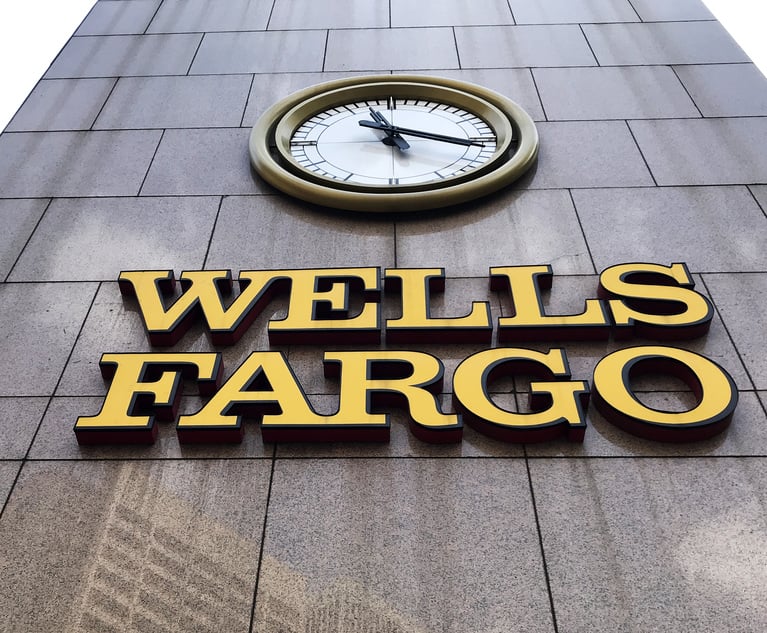Two More Ex-Wilmington Trust Executives Sentenced, Capping Prosecution Over Bank's Downfall
Both men were convicted in May, along with former Wilmington Trust president Robert V.A. Harra and David Gibson, who served as the bank's chief financial officer, of multiple crimes stemming from the bank's collapse in 2011.
December 19, 2018 at 05:55 PM
2 minute read
The original version of this story was published on Delaware Law Weekly
 Wilmington Trust
Wilmington Trust
The former chief credit officer and controller of Wilmington Trust were sentenced to prison Wednesday, capping the prosecution of four top executives for their roles in a massive reporting scandal that hid hundreds of millions of dollars in bad loans and ultimately led to the bank's downfall.
U.S. District Judge Richard G. Andrews of the District of Delaware sentenced William North, Wilmington Trust's lead credit officer, to four and a half years in prison and a $100,000 fine. Kevyn Rakowski, the bank's former controller, received a sentence of three years.
Both men were convicted in May, along with former Wilmington Trust president Robert V.A. Harra and David Gibson, who served as the bank's chief financial officer, of multiple crimes stemming from the bank's collapse in 2011.
On Monday, Andrews sentenced Harra and Gibson both to six years in prison and ordered them each to pay $300,000 in fines.
During a two month trial, federal prosecutors proved all four defendants conspired to falsely report to regulators and investors the amount of the bank's past due loans, causing the bank to underreport approximately $300 million in past due loans in the third and fourth quarters of 2009.
According to the indictment, the bank used the false securities filings to raise $287 million in a February 2010 stock sale. When the discrepancies were discovered in 2010, Wilmington Trust was sold to M&T Bank in a fire sale, which resulted in 700 employees losing their jobs.
U.S. Attorney David C. Weiss said Wednesday that the sentences sent a “clear message” that top corporate bankers cannot avoid reporting rules for disclosure regarding the soundness of financial institutions and their assets.
“The defendants' actions contributed to the downfall of an important Delaware institution, causing hundreds of employees to lose their jobs and investors to lose hundreds of millions of dollars when the bank's stock price collapsed,” Weiss said in a statement. “The sentences imposed by the court appropriately punish the defendants for their serious criminal conduct and strongly encourage other corporate executives to follow the law.”
This content has been archived. It is available through our partners, LexisNexis® and Bloomberg Law.
To view this content, please continue to their sites.
Not a Lexis Subscriber?
Subscribe Now
Not a Bloomberg Law Subscriber?
Subscribe Now
NOT FOR REPRINT
© 2025 ALM Global, LLC, All Rights Reserved. Request academic re-use from www.copyright.com. All other uses, submit a request to [email protected]. For more information visit Asset & Logo Licensing.
You Might Like
View All
'FTX' One Year Later: The Impact on Examiner Practice in Bankruptcy Courts
9 minute read
After 2024's Regulatory Tsunami, Financial Services Firms Hope Storm Clouds Break

FTX Estate Seeks to Recoup $1.76B From Binance, Plus Exec 'Piggy Bank' Payouts
3 minute read
Wells Fargo Seeks Declaratory Judgment Against 'YGC' Debt Collection Copyright Claim
4 minute readTrending Stories
- 1Judge Pauses Deadline for Federal Workers to Accept Trump Resignation Offer
- 2DeepSeek Isn’t Yet Impacting Legal Tech Development. But That Could Soon Change.
- 3'Landmark' New York Commission Set to Study Overburdened, Under-Resourced Family Courts
- 4Wave of Commercial Real Estate Refinance Could Drown Property Owners
- 5Redeveloping Real Estate After Natural Disasters: Challenges, Strategies and Opportunities
Who Got The Work
J. Brugh Lower of Gibbons has entered an appearance for industrial equipment supplier Devco Corporation in a pending trademark infringement lawsuit. The suit, accusing the defendant of selling knock-off Graco products, was filed Dec. 18 in New Jersey District Court by Rivkin Radler on behalf of Graco Inc. and Graco Minnesota. The case, assigned to U.S. District Judge Zahid N. Quraishi, is 3:24-cv-11294, Graco Inc. et al v. Devco Corporation.
Who Got The Work
Rebecca Maller-Stein and Kent A. Yalowitz of Arnold & Porter Kaye Scholer have entered their appearances for Hanaco Venture Capital and its executives, Lior Prosor and David Frankel, in a pending securities lawsuit. The action, filed on Dec. 24 in New York Southern District Court by Zell, Aron & Co. on behalf of Goldeneye Advisors, accuses the defendants of negligently and fraudulently managing the plaintiff's $1 million investment. The case, assigned to U.S. District Judge Vernon S. Broderick, is 1:24-cv-09918, Goldeneye Advisors, LLC v. Hanaco Venture Capital, Ltd. et al.
Who Got The Work
Attorneys from A&O Shearman has stepped in as defense counsel for Toronto-Dominion Bank and other defendants in a pending securities class action. The suit, filed Dec. 11 in New York Southern District Court by Bleichmar Fonti & Auld, accuses the defendants of concealing the bank's 'pervasive' deficiencies in regards to its compliance with the Bank Secrecy Act and the quality of its anti-money laundering controls. The case, assigned to U.S. District Judge Arun Subramanian, is 1:24-cv-09445, Gonzalez v. The Toronto-Dominion Bank et al.
Who Got The Work
Crown Castle International, a Pennsylvania company providing shared communications infrastructure, has turned to Luke D. Wolf of Gordon Rees Scully Mansukhani to fend off a pending breach-of-contract lawsuit. The court action, filed Nov. 25 in Michigan Eastern District Court by Hooper Hathaway PC on behalf of The Town Residences LLC, accuses Crown Castle of failing to transfer approximately $30,000 in utility payments from T-Mobile in breach of a roof-top lease and assignment agreement. The case, assigned to U.S. District Judge Susan K. Declercq, is 2:24-cv-13131, The Town Residences LLC v. T-Mobile US, Inc. et al.
Who Got The Work
Wilfred P. Coronato and Daniel M. Schwartz of McCarter & English have stepped in as defense counsel to Electrolux Home Products Inc. in a pending product liability lawsuit. The court action, filed Nov. 26 in New York Eastern District Court by Poulos Lopiccolo PC and Nagel Rice LLP on behalf of David Stern, alleges that the defendant's refrigerators’ drawers and shelving repeatedly break and fall apart within months after purchase. The case, assigned to U.S. District Judge Joan M. Azrack, is 2:24-cv-08204, Stern v. Electrolux Home Products, Inc.
Featured Firms
Law Offices of Gary Martin Hays & Associates, P.C.
(470) 294-1674
Law Offices of Mark E. Salomone
(857) 444-6468
Smith & Hassler
(713) 739-1250






